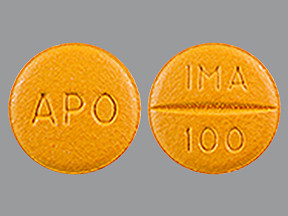IMATINIB - ORAL
PHONETIC PRONUNCIATION: (im-A-ti-nib)
COMMON BRAND NAME(S): Gleevec
GENERIC NAME(S): imatinib mesylate
Uses
USES: This medication is used to treat certain types of cancer (such as acute lymphoblastic leukemia, chronic myeloid leukemia, gastrointestinal stromal tumors, and myelodysplastic/myeloproliferative diseases). It is a chemotherapy drug that works by slowing or stopping the growth of cancer cells.
How to use IMATINIB - ORAL
HOW TO USE: Take this medication by mouth with a meal and a full glass of water (8 ounces/240 milliliters) as directed by your doctor, usually once or twice daily. Do not crush the tablets. If you have trouble swallowing the tablets whole, you may dissolve the tablets in a glass of water or apple juice. The amount of liquid will depend on your dose. Consult your doctor or pharmacist for more detailed instructions. Stir the mixture well until the tablet(s) dissolve, and drink right away. The dosage is based on your medical condition, response to treatment, and other medications you may be taking. Be sure to tell your doctor and pharmacist about all the products you use (including prescription drugs, nonprescription drugs, and herbal products). For children, the dosage is also based on their body size. Avoid eating grapefruit or drinking grapefruit juice while using this medication unless your doctor or pharmacist says you may do so safely. Grapefruit can increase the chance of side effects with this medicine. Ask your doctor or pharmacist for more details. Do not increase your dose or use this drug more often or for longer than prescribed. Your condition will not improve any faster, and your risk of side effects will increase. Since this drug can be absorbed through the skin and lungs and may harm an unborn baby, women who are pregnant or who may become pregnant should not handle this medication or breathe the dust from the tablets.
Side Effects
Precautions
Interactions
Overdose
Images

- color
- brownish-orange
- shape
- round
- imprint
- IMA 100, APO

- color
- brownish-orange
- shape
- oblong
- imprint
- IMA 400, APO

- color
- brown orange
- shape
- round
- imprint
- M, I 100

- color
- brown orange
- shape
- round
- imprint
- M, I 100

- color
- brown orange
- shape
- oblong
- imprint
- MYLAN, I 400

- color
- brown orange
- shape
- oblong
- imprint
- MYLAN, I 400

- color
- brownish-orange
- shape
- round
- imprint
- IMA 100, APO
Reviews
Faq for IMATINIB - ORAL
Imatinib is an oral medication that belongs to a class of drugs known as kinase inhibitors. It is primarily used to treat certain types of cancer, including leukemia and gastrointestinal stromal tumors (GIST).
Imatinib works by inhibiting the activity of specific proteins called tyrosine kinases, which are involved in the growth and multiplication of cancer cells. By blocking these proteins, Imatinib helps to slow down or stop the growth of cancer cells.
Imatinib is commonly used to treat chronic myeloid leukemia (CML) and acute lymphoblastic leukemia (ALL) that have a specific genetic mutation called the Philadelphia chromosome. It is also effective in treating GIST, a type of tumor that arises in the gastrointestinal tract.
Imatinib is usually taken orally, with or without food. The dosage and frequency of administration will depend on the specific condition being treated and the individual's response to the medication. It is important to follow the instructions provided by the healthcare provider.
Common side effects of Imatinib may include nausea, vomiting, diarrhea, stomach pain, muscle cramps, tiredness, headache, edema (swelling), and skin rash. Serious side effects such as heart problems and severe bleeding may rarely occur. It is essential to inform the doctor about any unusual or severe side effects experienced.
Imatinib can interact with several other medications, including certain antibiotics, antifungal drugs, antidepressants, and certain heart medications. Inform the healthcare provider about all the medications, supplements, and herbal products being taken to avoid potential interactions.
Imatinib should not be used during pregnancy unless clearly necessary, as it may harm the unborn baby. It is also not recommended while breastfeeding, as it may pass into breast milk and harm the nursing infant. Consult with a healthcare provider for guidance.
If a dose of Imatinib is missed, take it as soon as remembered, unless it is close to the time for the next scheduled dose. In that case, skip the missed dose and continue with the regular dosing schedule. Do not double the dose to make up for the missed one.
The duration of Imatinib treatment will depend on the individual's response to the medication and the specific condition being treated. Some individuals may need to take it for a few months, while others may require long-term or lifelong treatment. Follow the healthcare provider's instructions regarding the treatment duration.
Disclaimer
IMPORTANT: HOW TO USE THIS INFORMATION: This is a summary and does NOT have all possible information about this product. This information does not assure that this product is safe, effective, or appropriate for you. This information is not individual medical advice and does not substitute for the advice of your health care professional. Always ask your health care professional for complete information about this product and your specific health needs.


No Reviews Yet